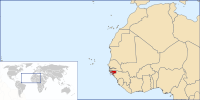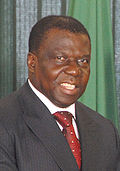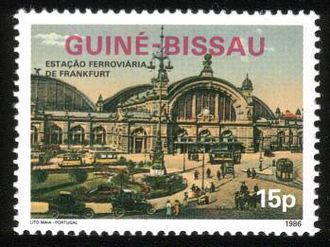- Portal:Guinea Bissau
-
- Wikipedia portals:
- Culture
- Geography
- Health
- History
- Mathematics
- Natural sciences
- People
- Philosophy
- Religion
- Society
- Technology
Guinea Bissau

The Republic of Guinea-Bissau (pronounced /ˈɡɪni bɪˈsaʊ/; Portuguese: República da Guiné-Bissau, pronounced: [ʁɛˈpublikɐ dɐ ɡiˈnɛ biˈsau]) is located in West Africa. It is bordered by Senegal to the north, and Guinea to the south and east, with the Atlantic Ocean to its west.
It covers nearly 37,000 square kilometres (14,000 sq mi) with an estimated population of 1,600,000. Formerly the Portuguese colony of Portuguese Guinea, upon independence, the name of its capital, Bissau, was added to the country's name to prevent confusion with the Republic of Guinea. The country's per-capita gross domestic product is one of the lowest in the world.Selected panorama

A typical scene of people on the streets of Guinea Bissau. Selected article
The balafon (bala, balaphone) is a resonated frame, wooden keyed percussion idiophone of West Africa; part of the idiophone family of tuned percussion instruments that includes the xylophone, marimba, glockenspiel, and the vibraphone. Sound is produced by striking the tuned keys with two padded sticks.
Believed to have been developed independently of the Southern African and South American instruments now called the marimba, oral histories of the balafon date it to at least the rise of the Mali Empire in the 12th century CE. Balafon is a Manding name, but variations exist across West Africa, including the Balangi in Sierra Leone and the Gyil of the Dagara, Lobi and Gurunsi from Ghana, Burkina Faso and Côte d'Ivoire. similar instruments are played in parts of Central Africa, with the ancient Kingdom of Kongo denoting the instrument as palaku. (Read more...)
Selected biography
João Bernardo "Nino" Vieira (27 April 1939 – 2 March 2009) was the President of Guinea-Bissau from 1980 to 1999 and again from 2005 to 2009. After seizing power in 1980, Vieira ruled for 19 years, and he won a multiparty presidential election in 1994. He was ousted at the end of the 1998–1999 civil war and went into exile. He made a political comeback in 2005, winning that year's presidential election. Vieira was killed by soldiers on 2 March 2009, apparently in retaliation for a bomb blast that killed Guinea-Bissau's military chief General Batista Tagme Na Waie. The military officially denied these allegations after Army officials claimed responsibility for Vieira's death.
Vieira described himself as "God's gift" to Guinea-Bissau during his tenure in office.
He was the only president of Guinea-Bissau to be assassinated.
In the news
- November 4: Diamonds: Anglo American to pay US$5.1 billion for 40% of De Beers
- October 25: Tunisia casts vote in first free election
- October 23: UN wants Gaddafi's death probed
- October 20: Former Libyan leader Gaddafi killed
- October 19: Kenya troops enter Somalia after kidnappings
- October 19: Jailed Swedish journalists tried as terrorists
- October 13: Eyewitnesses challenge Egyptian state media impartiality in fatal protests
- October 7: South African parliament questioned over media policy
Selected picture
Did you know?
- ...Of all localities on the Western African coast - where oil now is found in one country after the other - the geological formations off Guinea-Bissau have been denominated the most promising. Guinea-Bissau's offshore areas are considered under-explored as exploration efforts repeatedly have been interrupted by political crises.[1]
Categories
WikiProjects
Things to do
Wikimedia
Cite error: There are<ref>tags on this page, but the references will not show without a{{Reflist}}template or a<references />tag; see the help page.Categories:- Guinea-Bissau
- African portals
- Portals by country
Wikimedia Foundation. 2010.








